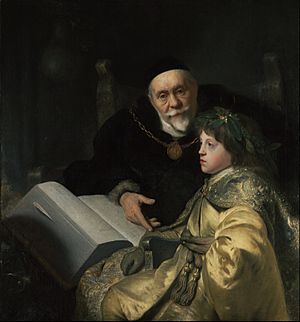Tutoring facts for kids
Tutoring is when someone gets extra help with their schoolwork or a specific skill from a private teacher. This teacher, called a tutor, is usually an expert in the subject. They spend time, maybe a few hours a week, helping the student (also called a tutee) understand things better. Tutoring can happen in many different places.
Contents
The History of Tutoring
Tutoring has been around for a very long time, even back in ancient Greece. At first, it was quite informal. Tutors would simply share their knowledge to help someone learn.
Over time, especially after the 1900s, tutoring became more organized. People started training tutors and finding better ways to help students. As more and more kids went to school, the need for extra help, like tutoring, also grew.
In ancient Rome, most kids went to public primary schools called ludi. But richer families often had tutors come to their homes. These tutors would teach their children many subjects in great detail.
Tutoring in British and Irish Schools
In British and Irish secondary schools, a form tutor is a teacher who looks after a group of students, usually about 30. They are part of a team led by a year leader. Form tutors often share information with parents about how their child is doing in school.
Outside of school, many students in the UK and Ireland get private tutoring. This is common for those who need extra help, especially before big exams. In Ireland, this kind of tutoring is often called grinds.
In British universities, a tutor is a general name for someone who teaches small groups of students.
Private Tutoring in Asia
Private tutoring is very popular in Asia. A study in 2012 found that it can take up a lot of time for young people and their families. It can also make social differences bigger and cost families a lot of money.
- In South Korea, almost 90% of elementary students get extra lessons, often called Hagwon.
- In Hong Kong, about 85% of older secondary students have private tutors.
- In India and Kazakhstan, about 60% of students get private tutoring.
The demand for tutoring in Asia is growing fast. This is partly because of how school systems are set up and cultural reasons. Also, many families have more money and fewer children, so they invest more in education.
Some tutors in Asia become very famous, almost like celebrities. They are sometimes called "the king/queen of tutorial." There are also many online platforms that connect students with tutors or offer learning materials.
In Cambodia, teachers often provide tutoring. In Hong Kong, it's done by individuals or large companies. In South Korea, technology is often used for tutoring.
Rules for Tutoring
In 2012, a study suggested that governments should look closely at how private tutoring affects families and schools. They recommended making regular schools better to reduce the need for private lessons. Rules are also needed to protect families.
For example, in China, a new rule called the Double Reduction Policy was made in 2021. It changed tutoring companies into non-profit groups. This helped reduce how much Chinese families spent on tutoring and made education fairer. Before this, families spent a lot of their money on extra classes.
How Much Does Tutoring Cost?
The cost of private tutoring can be very different depending on the country.
- In Pakistan, families spent about $3.40 a month per child on tutoring in 2011.
- In India, it was about $12.51 per month.
- In Hong Kong, the private tutoring business was worth $255 million in 2011.
- In Japan, families spent $12 billion on private tutoring in 2010.
- In South Korea, even though the government tried to control it, tutoring costs reached $17.3 billion in 2010. This was about 80% of what the government spent on public education for younger students.
In the United Kingdom, the cost depends on the subject, the student's age, the tutor's experience, and if the lesson is online or in person. Online tutoring from a qualified UK teacher might cost between £30 and £40 per hour. Schools sometimes help families with the cost through programs like the National Tuition Programme.
Does Tutoring Really Help?
Many studies show that students who get tutoring often do better in school. However, private tutoring isn't always effective. Sometimes, students might even skip regular classes or be too tired to learn because of too much extra study. This can make regular school less helpful.
In many countries, anyone can become a tutor without special training. In some places, teachers tutor after school because their regular salaries are very low.
Sometimes, teachers might focus more on their private lessons than on their regular classes. This can lead to problems, especially if they teach less in school to encourage students to pay for private lessons.
But when a tutor is well-trained, the help they provide can be amazing. Students can improve their performance a lot.
Different Kinds of Tutoring
Tutoring can happen in various ways, often overlapping. For example, one student might get help from another student online. Tutoring is usually private, meaning it's separate from regular school.
Academic Coaching
Academic coaching is like having a mentor for your studies. A coach helps students learn how to learn and how to succeed in school. While a tutor helps with specific subjects, a coach helps with things like:
- Study skills
- Time management
- Handling stress
- Taking good notes
- Doing well on tests
Coaches meet with students regularly. They help all kinds of students, not just those who are struggling. Academic coaching is also popular for preparing for entrance exams, especially in Asia.
Home-Based Tutoring
In-home tutoring is when a tutor comes to your house. This is different from going to a tutoring center or an after-school program. Usually, the tutor works one-on-one with the student. Because it's private, there isn't a lot of official information about how much home tutoring happens.
Online Tutoring
Online tutoring is when students get help over the internet. This can be scheduled or on-demand. Students and tutors use special apps with tools like chat, whiteboards, and video calls. Online tutoring is a newer way to get help compared to in-person lessons. It can help students feel more motivated to learn.
Many university students use online tutoring to earn money. However, some universities don't fully support this.
One challenge with online tutoring can be too much information at once. It can be hard to focus if there are too many things happening on the screen.
Peer Tutoring
Peer tutoring is when students teach or tutor other students from their own age group. This can involve students of different ages, backgrounds, or genders. It means one student helps another student learn.
How Tutoring Helps
School Performance
Studies show that peer tutoring helps students do better in subjects like reading, math, science, and social studies. It's especially good for improving reading skills, particularly for students who are struggling. Peer tutoring has also been very helpful for elementary students with learning disabilities.
One study found that even people who weren't trained teachers could help first-graders with reading. They tutored students one-on-one for 30 minutes, four days a week. These students did much better in reading, spelling, and decoding than students who didn't get tutoring.
Money Matters
Some types of tutoring cost money, but often, tutoring is free. This makes it affordable for students from all backgrounds. Free tutoring can be very helpful for kids from families with less money.
However, paid tutoring can create differences between rich and poor families. A study found that families with more money could afford private tutoring more easily. This meant they got more benefits from it than families with less money.
Things to Think About with Tutoring
Tutoring as "Shadow Education"
Tutoring is often called "shadow education" because it happens outside of regular school. It's like a shadow because:
- It exists because formal schools exist.
- Formal school is the main system, and tutoring is its shadow.
- The main focus is still on learning in school.
- Tutoring is often less formal than regular school.
Sometimes, private tutoring can become so popular that it seems more important than regular school. Students might feel that private tutors are better at preparing them for exams.
Who Uses Tutoring Services?
A study in 2009 showed that only 22% of students received tutoring services, even though 60% of their parents knew about these services. On the other hand, only 13% of students got tutoring when their parents didn't know about the services. This shows that knowing about tutoring options can make a difference.
Tutoring Agencies
A tutoring agency is a business that connects students looking for tutors with tutors who want to offer their services. In places like Singapore and Malaysia, they are often called tuition agencies.
What Do They Do?
Tutoring agencies help parents and students find the right tutor for specific subjects. They usually charge a fee for this service. Sometimes, the agency charges the client directly. Other times, they charge the tutor a commission from their first month's earnings. In Singapore, tutors might pay half of their first month's fee to the agency.
Some agencies give clients a list of tutors, and the client contacts them directly. Other agencies handle all the arrangements and payments, acting as the employer for the tutors.
Tutoring Around the World
Tutoring agencies are common in many countries, including Australia, Canada, Malaysia, Singapore, the UAE, the UK, and the USA. However, they are not always regulated by the government.
In the UK, a group called The Tutors' Association was set up in 2013. In the US, there are several professional tutoring groups, like the American Tutoring Association. In Australia, there is the Australian Tutoring Association.
In Singapore, tutoring agencies are not regulated by the Ministry of Education.
About Tutors
Tutors can work full-time or part-time. Some part-time tutors are university students who want to earn extra money.
Many tutors are self-employed. If they work through an agency, the agency might take a fee from what the tutor charges. In Singapore, tutors often pay a percentage of their first month's fee to the agency for finding them a student.
If an agency employs the tutors directly, they handle all payments and benefits for the tutors.
Images for kids
See also
 In Spanish: Tutor para niños
In Spanish: Tutor para niños
- Cram school
- Homework coach
- Learning by teaching
- Mentorship
- Peer-mediated instruction
- Teacher
- Tuition agency
- Tutorial
- Virtual education
- Double Reduction Policy
 | Sharif Bey |
 | Hale Woodruff |
 | Richmond Barthé |
 | Purvis Young |





